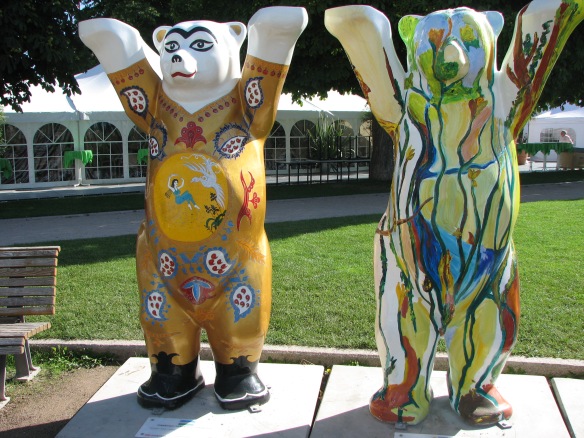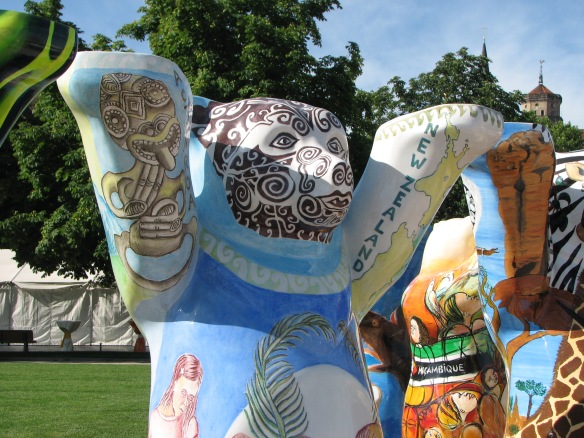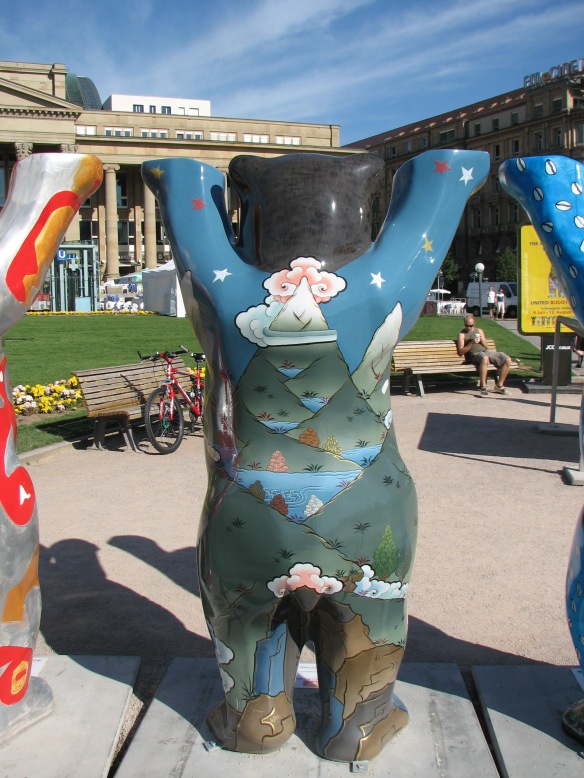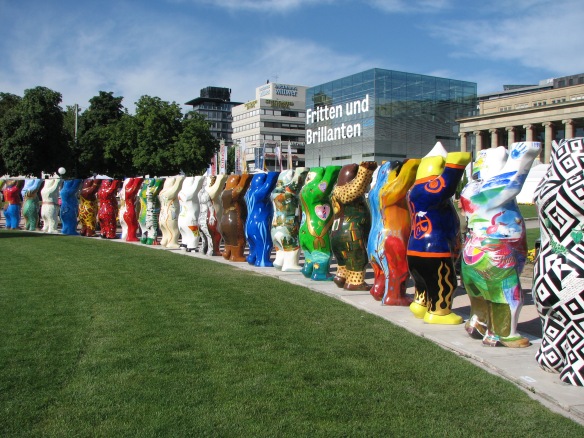Eva Herlitz was born on July 28, 1952 in Solingen, Germany. She was a teacher and interior decorator, and a visionary. Eva Herlitz and her husband Klaus created the wonderful United Buddy Bears. The couple invited artists from every country in the world to decorate oversized bear statues. The Buddy Bears are placed in circles side by side, in exhibits that tour around the globe and are always free to the public. Donations are raised for UNICEF and other charities for children. According to the Buddy Bears website: “Since 20th June 2001, when the Buddy Bears appeared in Berlin’s streets and squares for the first time, Buddy Bear activities and help for children in need have formed an inseparable unit.” In Eva Herlitz’s honor here I give you the post I wrote after The Buddy Bears came to downtown Stuttgart. – Jadi
Many people feel Berlin is now the cultural heart of Europe. Creative impulses come from Germany’s capital and spread from there. One of the quirkiest is the Buddy Bears.

The Buddy Bears creators were inspired by the cow parades in New York and Zurich. Eva and Klaus Herlitz of Berlin wanted to initiate a similar street art project. The bear is the icon of Berlin, and thus in 2001, the Herlitzes created the first bear with a sculptor named Roman Strobl.
Their projected expanded, and in 2002 it went international. They had a bear created for every country the UN acknowledges, designed by artists native to each country. The bears have their arms raised as if they’re holding hands. (This can also be described as the laughing Buddha pose.) Each bear is painted with images of the culture, history, landscape, economy, art and music of its country.
The first display took place in a circle around Berlin’s Brandenburg Gate. The circle symbolizes the Art of Tolerance. One and a half million people saw the exhibit, and since then, they’ve toured 5 continents and stood in an alphabetical circle in the centers of host cities.


I saw the Buddy Bears in 2008 when they came to the Schlossplatz in downtown Stuttgart. They send a message about peace, understanding, love and tolerance among the world’s nations, cultures and religions.
When new bears are commissioned, the older ones are auctioned off. All monies go to UNICEF and other childrens’ charities. As of September 2018, 2,300,000 Euros have been raised for charities such as Eva Herlitz’s Buddy Bear Help!
Over 240 artists have been involved in the project, and more than 30 million visitors have seen the United Buddy Bears. A smaller circle of United Buddy Bears-The Minis (1 meter high) also tours.

The United Buddy Bears exhibitions are always opened by national and foreign dignitaries. After he saw the bears in Berlin, actor Jackie Chan made sure they came to Hong Kong. When UNICEF Goodwill Ambassador Sir Peter Ustinov saw them, he insisted that Iraq be represented.
There is one very special grey and white polar bear. He has the image of Albert Einstein and the following quote: ‘Peace cannot be kept by force. It can only be achieved by understanding’.

It’s fascinating to consider that United Buddy Bears change their order as they travel. The circle is always organized in the language of the host country. Buddy Bears may suddenly hold hands with distant or hostile neighbors…
In memory of Eva Herlitz, 28 July 1952 – 26 February 2021
Selected Bibliography:
Herlitz, Eva & Klaus, United Buddy Bears — Die Kunst der Toleranz. Bostelmann & Siebenhaar Publishers, 2003. ISBN 3-936962-00-6.
Herlitz, Eva & Klaus, United Buddy Bears — World Tour. NeptunArt Publisher, 2006. ISBN 3-85820-189-8.
Herlitz, Eva & Klaus, United Buddy Bears — The Art of Tolerance. 384 pages, English/German, December 2009, ISBN 978-3-00-029417-4.
NOTES: Photos and Text© 2013 Jadi Campbell. Previously published as The United Buddy Bears. To learn more: Buddy Bears website. I am a Best American Essays-nominated writer. My award-listed books are Broken In: A Novel in Stories, Tsunami Cowboys, Grounded, The Trail Back Out, and The Taste of Your Name. My most recent book,




















 Anne Frank was born on June 12, 1929 in Frankfurt am Main, Germany. Her unexpectedly discovered journal The Diary of Anne Frank is a testament to the endurance of the human spirit. In honor of her life I am reprinting my first post about Stolpersteine, the Stumbling Stones laid throughout the world to remember the lives of those killed by repressive regimes. – Jadi
Anne Frank was born on June 12, 1929 in Frankfurt am Main, Germany. Her unexpectedly discovered journal The Diary of Anne Frank is a testament to the endurance of the human spirit. In honor of her life I am reprinting my first post about Stolpersteine, the Stumbling Stones laid throughout the world to remember the lives of those killed by repressive regimes. – Jadi














